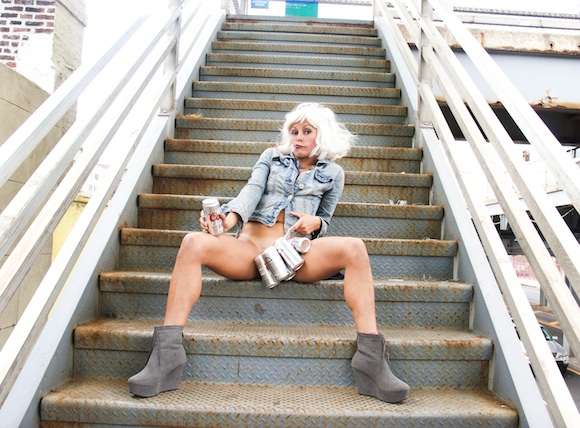
Of all the subjects stand-up comedians tend to leave untouched, rape is among the most verboten. Well sure, that makes a lot of sense. Rape is not a historical event that is “too soon” until it isn’t, nor is it a cultural anomaly that is “too close to home” in some places but not in others. In short, rape is not something that anyone can or should take lightly.
New York-based comedian Adrienne Truscott has a different opinion. “I think any topic is on the table for comedy,” Truscott says. “It’s whether or not you approach a topic with rigor or with laziness, that can determine whether it succeeds or not.” She’s been touring a one-woman show called Asking For It: a one-lady rape about comedy starring her pussy and little else!
Truscott’s dyslexic tagline for the show is intentional, of course. Because it isn’t a show about rape. It’s about comedy about rape. “I’m taking a shot at people who make lazy jokes about it,” says Truscott. The distinction may sound heady and pedantic, but it’s an important distinction: not rape as phenomenon, but rape as an ill-treated subject matter among comics.
Truscott feels that lazy comedy creates the illusion of gender disparity, where the issue is actually just talent. “Sometimes a guy makes a bad rape joke. And people are offended, so his defense is like, ‘Free speech! Free speech!’ But it’s not about free speech. It’s just about whether the joke was funny. If you’re a comic making lazy jokes about rape you should remember that your audience might be more informed and mature than you are. You might accidentally be making yourself irrelevant.”
By the way, if you need a refresher on what lazy humor sounds like, I suggest Lena Dunham’s recent mock quiz about Jewish stereotypes, published in the New Yorker’s Shouts and Murmurs last month. Dunham got slammed for her article by Jewish rights advocates and culture-mongers alike—but everyone’s biggest criticism was a fairly innocuous one: namely, that Lena’s joke was just poorly executed.
Truscott doesn’t stop at laziness when taking her contemporaries’ humor to task, though. She claims the challenge of joking about rape is seeded by the way we perceive the women who tell the jokes. In particular, we’ve got to check our knee-jerk curiosity about whether these comics are victims of rape. “It’s something I’m asked a lot,” Truscott said. “I think most women have had some experience—whether it was indignation with legislation, or a story from someone they know. [That question] accidentally does a thing, though, where it assumes that a woman’s material is autobiographical or subjective. It forgets its own implication, that a woman couldn’t just make a joke on a topical subject.”
Lucky for us, that stigma seems to have skipped Brooklyn. Our female comedians are consistently recognized as champions of the alternative comedy form, which often sees them discussing topics others might deem “unladylike.” I mean, the agency of Broad City in that respect is just undeniable. “Not only is that show hilarious, but it’s also incredibly multifaceted to write a woman’s perspective,” agrees Truscott. “And that seems so obvious, like such an old rant, but Broad City is an immediate indication: when women write their own material, it comes with truth and experience.”
Despite Truscott’s vision of a future with smarter comics, it’s hard to say whether we’ll ever see an age where men can joke about rape. The topic itself is complicated, and we just don’t laugh at a joke the same way when a woman says it or a man says it. At the very least, though, comedy is a good place to start the conversation. “Good humor can approach a heavy topic with greater success than a lecture,” Truscott says. “And live theater is especially good, to ask people to pay attention. We’ve learned to half-pay attention when watching a screen. The stage provides space for a real, 3D unedited person, with their actual body language, unmediated by a camera.”
Asking For It runs for two Saturdays, April 11 and 18, at Joe’s Pub. Doors at 11:30pm, show at midnight. Tickets are $15. There’s a two-drink minimum, but you’ll probably want a few in you anyway to get comfortable for Truscott’s show. Though the show itself may leave a strong first impression, Truscott sees herself much like any other comic trying out some new material. “I definitely don’t want to be the ‘rape lady’ for the rest of my life. This was just one thing I had to get off my chest.”
Leave a Reply



